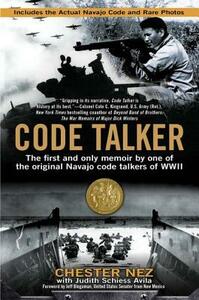Take a photo of a barcode or cover
informative
inspiring
reflective
medium-paced
This book is important because it sheds light on something that honestly I didn't know about until I first picked this book up a few years back, at the National Museum of the American Indian. However, I only just read this now. The Navajo Code Talkers are absolutely American heroes, in particular in WW2, and this book is important in keeping their story alive.
Judith Schiess Avila and Chester Nez worked together to compose this book by, from what I understand, their conversations. It is a first-person memoir that highlights Chester Nez's experiences during World War II, as a Navajo, who was one of the original 29 code talkers, that helped design and formulate the code, which was based on the Navajo language.
Overall, I enjoyed it! I enjoyed learning about this piece of history that is really seldom talked about. Moreso, it's from a first-hand account, and we got to see, a glimpse of what being a code-talker/messenger was like during World War II. It was also enlightening in terms of actually getting to learn about the Navajo people and their language, as it is sprinkled throughout. What's super cool, is there's a whole dictionary for the code at the end, and admittedly a handful of the words are probably not PC.
Judith Schiess Avila and Chester Nez worked together to compose this book by, from what I understand, their conversations. It is a first-person memoir that highlights Chester Nez's experiences during World War II, as a Navajo, who was one of the original 29 code talkers, that helped design and formulate the code, which was based on the Navajo language.
Overall, I enjoyed it! I enjoyed learning about this piece of history that is really seldom talked about. Moreso, it's from a first-hand account, and we got to see, a glimpse of what being a code-talker/messenger was like during World War II. It was also enlightening in terms of actually getting to learn about the Navajo people and their language, as it is sprinkled throughout. What's super cool, is there's a whole dictionary for the code at the end, and admittedly a handful of the words are probably not PC.
Graphic: War
Minor: Racism
This is a well done memoir of Chester Nez, who was both one of the original Navajo code talkers, but the one who outlived the rest. He talks about his life before the war which gives a look into the traditional Navajo was of life, as well as the war years an how he lived afterwards. Facts that Mr Nez wouldn’t have know and clarifications are offered by his co-author.
informative
inspiring
fast-paced
Probably not the best written book I’ve ever read but it’s such a remarkable story of Chester Nez and his life as a Navajo code talker in WWII. But the descriptions of his childhood and school and life on his grandmother’s farm are a great peek into Navajo life, celebrated and oppressed. Remarkable that he went from being reprimanded from speaking Navajo at school to being part of a secret mission to speak Navajo code.
informative
inspiring
reflective
medium-paced
I had heard of code talkers before but didn't really know much about them until I read this book. It was very insightful and informative but what was happening on the Pacific front during World War 2. While reading I also enjoyed learning more about the Navajo Nation since I didn't know much beforehand.
Moderate: Death, War
Minor: Animal death
3.5 stars
This is a fascinating memoir. My favorite parts were the descriptions of how the first corps of Navajo Code Talkers used their language to develop the code that played such an important role in WWII, and Chester Nez's account of his life before he enlisted in the Marines and the first several years after he returned home.
CW: anti-Japanese bigotry and use of anti-Japanese slurs
This is a fascinating memoir. My favorite parts were the descriptions of how the first corps of Navajo Code Talkers used their language to develop the code that played such an important role in WWII, and Chester Nez's account of his life before he enlisted in the Marines and the first several years after he returned home.
CW: anti-Japanese bigotry and use of anti-Japanese slurs
adventurous
informative
reflective
medium-paced
emotional
informative
slow-paced
Very interesting story. I loved the history and traditions of the Navajo as told here. Amazing their secret code was kept secret so long.
Before reading Code Talker by Chester Nez, I knew of the Navajo Code Talkers of World War II, but I didn't know much about them. I learned so much from this book!
First, I must say the book starts out with a war scene straight away. Lots of statistics, dates and numbers are thrown out and I thought if the entire book was going to be like this, I was in deep trouble. But it didn't get very far before Chester flashes back to his childhood on the Checkerboard area just outside of the Navajo Nation. It was here that his story caught my attention and never let go.
Chester grew up in the 1920s (wow, a hundred years ago) tending his grandmother's sheep and goats. He loved his family, the animals, the land. He paints a beautiful picture of his childhood - until he is sent to boarding school, where things are much harsher for him. I want to share his story, but that would take away the enjoyment of reading the book for yourself so I'll let you discover the ups and downs of Chester's pre-war and post-war life if you decide to read the book. I will say that I was saddened to hear his first hand story of some of the horrible things that happened to him and his family because of their heritage.
I also learned volumes about World War II. My birthday falls on D-Day, so I've made it a point to learn quite a bit about the war in Europe. But I knew very little about what happened in the South Pacific. The stories he shares are harrowing. And the Code Talkers were right in the thick of things to get important information to and from the front lines. They were all incredibly brave. Chester served in the U.S. Marine Corps. Just hearing him talk about the Marines made my heart swell with pride. My father was a career Marine, serving 20 years, some of that time in Vietnam. To this day when I see a young person in a Marine uniform my eyes well up with tears. So there's just one more reason why I loved Chester's story.
The Code Talkers weren't permitted to share any details about what they did until the late 1960s. They were forced to spend more than 20 years keeping their accomplishment to themselves. During that time, they received no recognition for what they did. They weren't able to put the skills they used on a resume. Can you imagine? Many of the original Code Talkers died before they were ever able to tell anyone. That makes my heart ache. But once their work became declassified, the remaining Code Talkers began receiving the recognition they deserved. In fact, I didn't realize there was a memorial dedicated to them in the Pentagon in Washington, D.C. I would love to visit and see it in person.
The story and the history shared in the book are amazing. The writing is less than amazing - for example the flat statistics that opened the book and almost killed my enthusiasm to read it. I don't blame Chester Nez for this. Chester's story was penned by Judith Schiess Avila. It could have been better written, so it's not a perfect five star read. I'm still giving it 4 stars. I didn't want it to end. I wanted to hear more about Chester's life. I could have listened for days to his stories about his childhood, his friends in the war, and his years after the war.
First, I must say the book starts out with a war scene straight away. Lots of statistics, dates and numbers are thrown out and I thought if the entire book was going to be like this, I was in deep trouble. But it didn't get very far before Chester flashes back to his childhood on the Checkerboard area just outside of the Navajo Nation. It was here that his story caught my attention and never let go.
Chester grew up in the 1920s (wow, a hundred years ago) tending his grandmother's sheep and goats. He loved his family, the animals, the land. He paints a beautiful picture of his childhood - until he is sent to boarding school, where things are much harsher for him. I want to share his story, but that would take away the enjoyment of reading the book for yourself so I'll let you discover the ups and downs of Chester's pre-war and post-war life if you decide to read the book. I will say that I was saddened to hear his first hand story of some of the horrible things that happened to him and his family because of their heritage.
I also learned volumes about World War II. My birthday falls on D-Day, so I've made it a point to learn quite a bit about the war in Europe. But I knew very little about what happened in the South Pacific. The stories he shares are harrowing. And the Code Talkers were right in the thick of things to get important information to and from the front lines. They were all incredibly brave. Chester served in the U.S. Marine Corps. Just hearing him talk about the Marines made my heart swell with pride. My father was a career Marine, serving 20 years, some of that time in Vietnam. To this day when I see a young person in a Marine uniform my eyes well up with tears. So there's just one more reason why I loved Chester's story.
The Code Talkers weren't permitted to share any details about what they did until the late 1960s. They were forced to spend more than 20 years keeping their accomplishment to themselves. During that time, they received no recognition for what they did. They weren't able to put the skills they used on a resume. Can you imagine? Many of the original Code Talkers died before they were ever able to tell anyone. That makes my heart ache. But once their work became declassified, the remaining Code Talkers began receiving the recognition they deserved. In fact, I didn't realize there was a memorial dedicated to them in the Pentagon in Washington, D.C. I would love to visit and see it in person.
The story and the history shared in the book are amazing. The writing is less than amazing - for example the flat statistics that opened the book and almost killed my enthusiasm to read it. I don't blame Chester Nez for this. Chester's story was penned by Judith Schiess Avila. It could have been better written, so it's not a perfect five star read. I'm still giving it 4 stars. I didn't want it to end. I wanted to hear more about Chester's life. I could have listened for days to his stories about his childhood, his friends in the war, and his years after the war.


